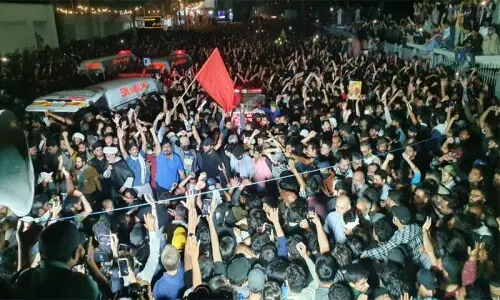It is a sad fact that most of Urdu's literary writings are devoted to portraying urban life and the ethos of the rural areas are rarely depicted, if ever. Though for the sake of argument some names of Urdu writers who have portrayed rural life in their writings are mentioned, they are so few (considering the long history of Urdu literature) that it amounts to nothing.
The writers admired for the portrayal of rural life are Prem Chand, Abdullah Hussain, Ahmed Nadeem Qasmi, Qurrat-ul-Ain Hyder, Jameela Hashmi, Qazi Abdus Sattar, Balwant Singh, Ghulam-us-Saqlain Naqvi and some others. But the fact remains that Urdu literature consists largely of the body of writings that are created for the urbanites and by the urbanites that talk, most of the time, of urbanites. The reason, perhaps, is that most of our writers belong to small or big cities and their themes have to be about the educated middle class or, at the most, the lower class living in cities and on the fringe of urban society. They have virtually had no experience of the rural life to write about.
By contrast, in the western literature, there is an entire genre named rural novel, writes Roger Fowler, devoted “to portraying rural characters in rural environment”. In German literature of the middle and late 19th century the genre of rural novel “enjoyed a wave of popularity”, says Fowler. It remained quite popular in French literature as well for quite some time. Dr Muhammad Hasan, one of the renowned Marxist critics of Urdu that India has produced after the independence, writes in his book ' Adabi samajiyat ' that our attachment with towns has alienated us from villages. Though Prem Chand talks of rural society, he shows sympathy for the landowners, says Dr Hasan, and then he lashes out at Qurrat-ul-Ain Hyder and Qazi Abdus Sattar for sympathising with the 'decadent' feudal class while portraying the rural society. The reason for that, he thought, though many won't agree to it, was that these two belonged to feudal class themselves.
But an Urdu writer who constantly and faithfully portrayed the rural spirit, the problems and drawbacks of the rural society and won Unesco award for it (and yet was ignored by the critics) is Abul-Fazl Siddiqi. His name is rarely mentioned while the rural milieu is discussed. The reason for ignoring him is perhaps that the writings of Abul-Fazl Siddiqi are scattered and buried in the ages-old literary magazines, says Dr Jameel Jalibi in one of his articles. Another reason is that after the publication of ' Ahram ' — his first collection of short stories — in 1943, it took him 43 years to get his other collections published. In 1982, his three collections of short stories were published. The collections contained all in all 14 short stories which, according to Dr Jalibi, represent hardly one tenth of his works as he has penned over 200 stories in addition to novels and novellas.
The portrayal of life and cultural values of rural UP is what Abul-Fazl Siddiqi's writings are concerned with — most of the time. His characters, environment and even the language that his characters speak is a true depiction of life in UP villages. It is an environment in which the relationship between peasants and landowners is nothing short of slavery and it includes exploitation of women of the lower class as well. So much so that a new term 'moulazada' was coined in that UP society of the pre-independence era to mention a child fathered by a feudal lord borne by a woman of lower class (out of wedlock, of course). This term and many other peculiar expressions, dialectic Urdu and rural metaphors used by Abul-Fazl Siddiqi in his writings reflect the true colour of the society. It comes from the first-hand experience as it was the environment he was born in and lived in for almost half his life. His works are full of expressions and terms peculiar to hunting (Siddiqi was an avid hunter) as well. Some terminology employed by him (which urbanites like us know very little of) is so peculiar that many words are not listed even in the most authentic dictionaries of Urdu. Muhammad Abul-Fazl Siddiqi was born in Arifpur, district Badayun, UP, on September 3, 1908. He wrote four novels: ' Tazeer ', ' Suroor ', ' Tarang ' and posthumously published ' Zakhm-i-dil '. ' Din dhalay ', ' Gulab-i-khas ' and ' Dafeena ' are his novellas while ' Insaaf ', ' Juwala mukh ' and ' Aaina ' are collections of short stories. His other books include ' Ahad saaz log ' (pen-sketches) and ' Kahan ke der-o-haram ' (autobiography). His short story ' Gul zameen ki talash ' won Nuqoosh Presidential Award in 1983. Some of his works still remain unpublished.
Abul-Fazl Siddiqi died on September 16, 1987 in Karachi and was buried in Paposh Nagar graveyard.
drraufparekh@yahoo.com





























